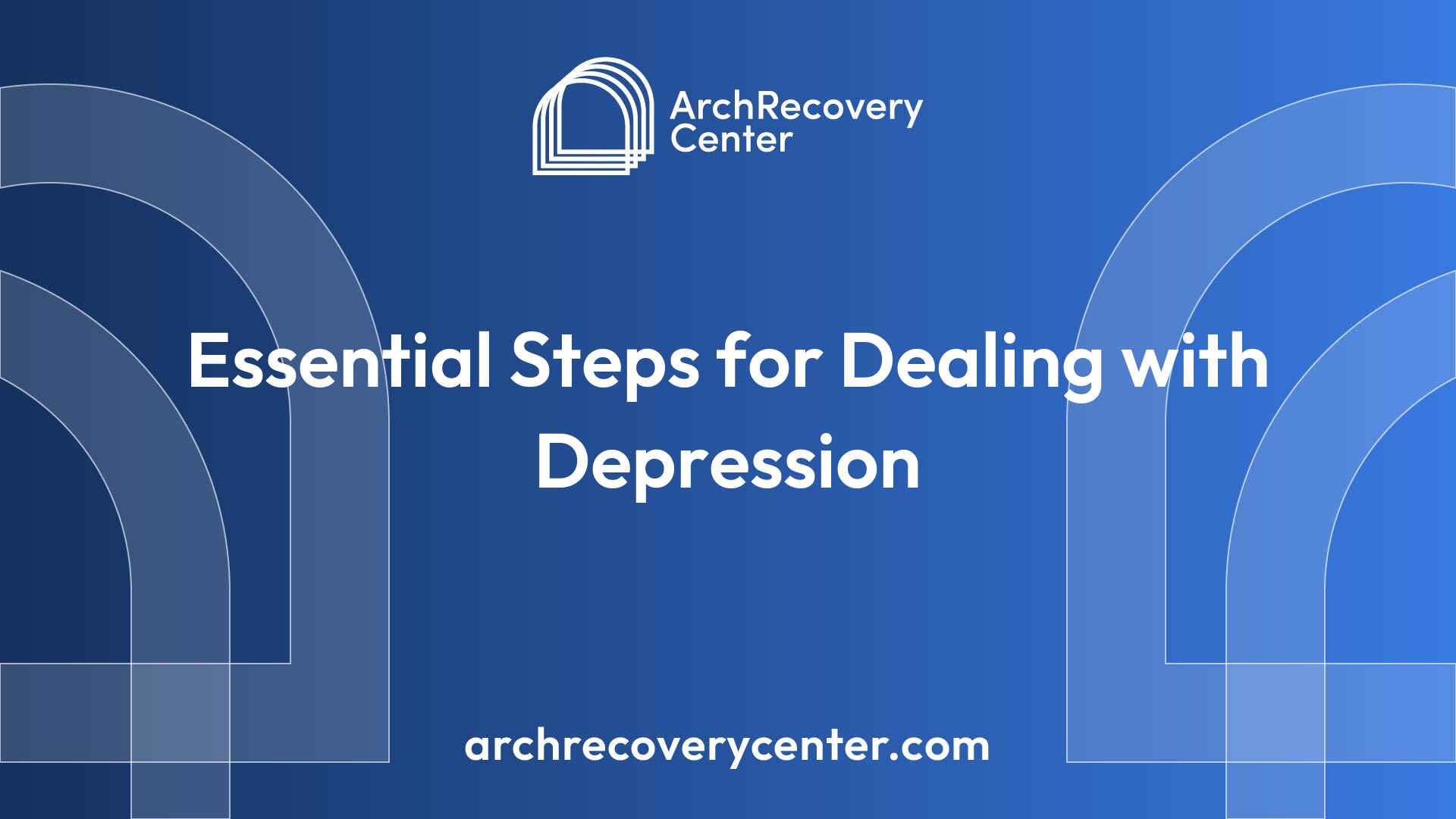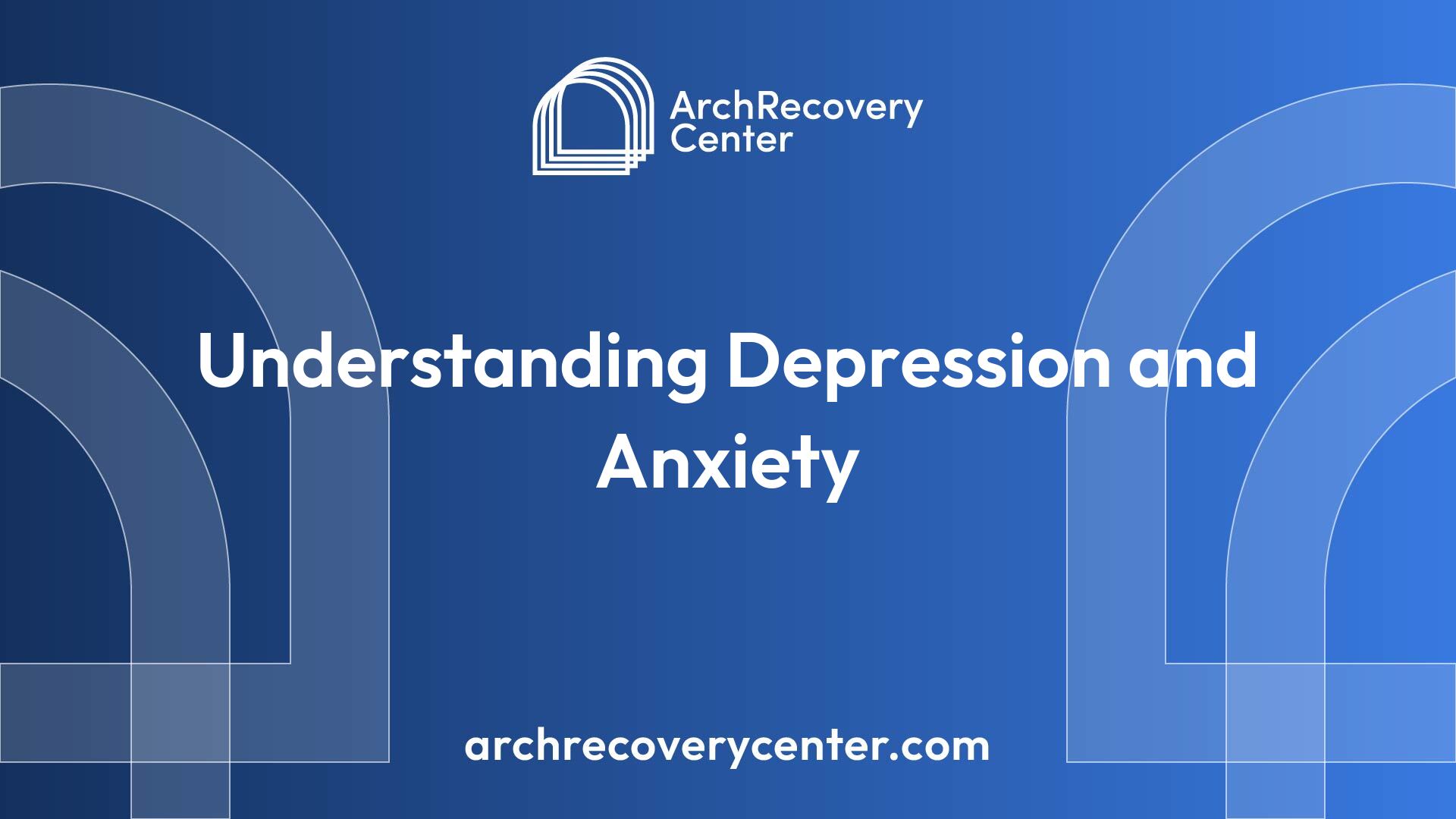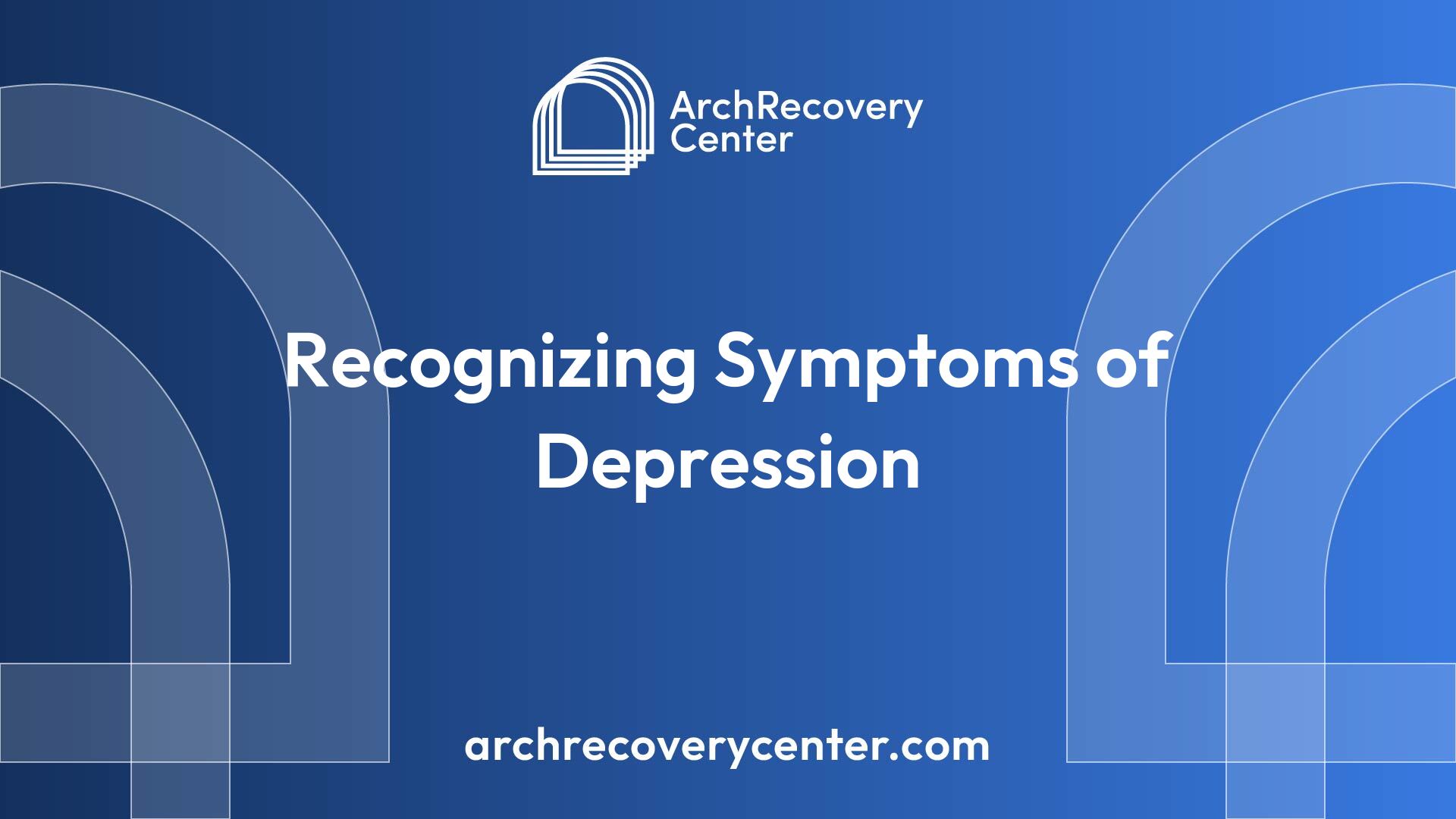Essential Steps for Dealing with Depression


Understanding Depression and Anxiety
Prevalence and Impact
Depression and anxiety are prevalent mental health disorders that affect millions of people worldwide. In 2019, an estimated 280 million individuals, representing approximately 5% of all adults, experienced depression. The impact of these disorders extends beyond personal suffering, resulting in significant societal costs. Researchers estimate that depression and anxiety lead to a loss of around 12 billion productive workdays each year, costing nearly USD 1 trillion [1].
Gender differences play a crucial role in the prevalence of depression. Women are diagnosed with depression more frequently than men, with higher rates observed among pregnant women and new mothers, where more than 10% experience depressive symptoms. Men, on the other hand, often have their symptoms undiagnosed or undertreated, as they may be less likely to seek help or discuss their emotional problems [2].
GroupEstimated Prevalence (%)Men5%Women9%Pregnant Women>10%
Approximately 1 in 5 U.S. adults have received a diagnosis of depression in their lifetime, indicating the widespread nature of this mental health issue [3].
Risk Factors and Causes
Understanding the risk factors and causes of depression is essential for effective management and intervention. Several elements contribute to the development of depression, including biological, environmental, and psychological factors.
Understanding these risk factors and the overall prevalence of depression lays the groundwork for identifying effective strategies for dealing with depression. Awareness and education can help reduce stigma and encourage individuals to seek the help they may need.

Recognizing Symptoms of Depression
Identifying the signs of depression is crucial for addressing the condition effectively. Symptoms of depression can be categorized into three main types: emotional symptoms, physical symptoms, and behavioral symptoms. Understanding these indicators can assist individuals in recognizing when they or someone they care about may need help.
Emotional Symptoms
Emotional symptoms are often the most evident signs of depression. Common emotional indicators include:
Emotional SymptomsPersistent sadnessFeelings of hopelessnessLoss of interest in previously enjoyed activitiesFeelings of guilt or worthlessnessDifficulty concentratingThoughts of suicide or self-harm
These emotional symptoms can last for weeks or months and significantly interfere with daily life, relationships, and overall well-being. Those experiencing these symptoms should consider seeking assistance, as they are often linked to more severe forms of depression.
Physical Symptoms
Depression can also present various physical symptoms. Common physical symptoms include:
Physical SymptomsPersistent fatigueSleep disturbances (insomnia or oversleeping)Changes in appetite (weight loss or gain)Unexplained aches or painsPsychomotor agitation or retardation
These physical manifestations can make managing daily responsibilities challenging and may lead to additional health issues if not addressed. It's important for those experiencing these symptoms to explore possible treatments and support.
Behavioral Symptoms
Behavioral symptoms reflect changes in an individual’s actions and interaction with others. Notable behavioral symptoms include:
Behavioral SymptomsWithdrawal from social activitiesNeglect of responsibilitiesChanges in work performanceIncreased irritabilityUse of alcohol or drugs as coping strategies
Such behavioral changes can impact not only the individual but also their relationships and community interactions. Recognizing these signs in oneself or others is vital for taking steps towards recovery [2].
Understanding these symptoms is a significant first step in dealing with depression effectively, and individuals are encouraged to reach out for help if they recognize any of these signs in themselves or loved ones.
Seeking Help and Diagnosis
Importance of Seeking Help
Seeking assistance for symptoms of depression is vital for recovery. Individuals experiencing persistent low moods that last most of the day, every day, for over two weeks are encouraged to contact a general practitioner (GP) or a mental health professional. Rapid improvement in mood may occur, but continuous symptoms demand medical attention.
If feelings of depression are present, scheduling an appointment with a healthcare provider should be a priority. Immediate help is essential if there are thoughts of self-harm or suicidal tendencies; in such situations, one should contact emergency services, such as calling 911 or the local emergency number.
Below is a table summarizing when to seek help:
DurationRecommendationsLess than 2 weeksMonitor mood; may improve without intervention.2 weeks or moreSeek help from a GP or mental health professional.Suicidal thoughtsSeek immediate emergency assistance.
Diagnostic Procedures
Understanding how depression is diagnosed can help alleviate some uncertainty surrounding the process. Diagnosis generally involves a combination of medical history reviews, interviews, and standardized assessments to gauge mood and behavior. Healthcare providers may use several tools and criteria from the Diagnostic and Statistical Manual of Mental Disorders (DSM-5) to assess the severity and influence of symptoms.
Key diagnostic procedures include:
Additionally, patients may inquire about participating in clinical trials, which research new methods for treating or preventing depression. These trials are essential for advancing mental health treatment options. Individuals interested in such studies should engage in discussions with their healthcare provider to weigh the benefits and risks involved. For those struggling with depression and anxiety, understanding the diagnosis process can be an empowering step towards recovery.
Treatment Options for Depression
Dealing with depression often involves a multifaceted approach that may include psychotherapy, counseling, and medication therapies. Understanding these treatment options is essential for finding the best path to recovery.
Psychotherapy and Counseling
Psychotherapy, also known as talk therapy, is an effective treatment method for depression. Various approaches can be utilized, including:
Many individuals benefit from combining psychotherapy with medication, promoting a holistic approach to treatment. A table displaying the effectiveness of various psychotherapeutic methods may be useful for readers:
Therapy TypeDescriptionEffectivenessCognitive Behavioral Therapy (CBT)Changes negative thought patternsHighInterpersonal Therapy (IPT)Focuses on relationship challengesModerate to HighPsychoanalytic TherapyExplores unconscious processesVariable
Psychotherapy sessions vary in length, typically lasting from 30 to 60 minutes, and may be scheduled weekly or biweekly depending on individual needs and preferences.
Medication Therapies
Medication is another common option for treating depression, often in tandem with psychotherapy. Antidepressants are typically the go-to choice. Their effectiveness can vary from person to person, and these medications may take several days to weeks to show results. Some important points include:
A brief comparison of common medication types may help:
Medication TypeCommon ExamplesNotesSSRIsFluoxetine, SertralineSafer side effect profileSNRIsVenlafaxine, DuloxetineWorks on serotonin and norepinephrineAtypical AntidepressantsBupropion, MirtazapineAlternative options for those who do not respond to SSRIs/SNRIs
For those experiencing severe or treatment-resistant depression, brain stimulation therapies may be recommended, including electroconvulsive therapy (ECT) and repetitive transcranial magnetic stimulation (rTMS).
Both psychotherapy and medication therapies play crucial roles in the successful management of depression. Understanding the different options available facilitates informed decisions for those coping with this condition. For more support and resources, individuals can explore topics related to struggling with depression and anxiety and other associated challenges.
Supporting Individuals with Depression
Supporting someone who is dealing with depression can be a vital part of their recovery process. It involves providing both emotional and practical forms of assistance to help them navigate their challenges.
Providing Emotional Support
Creating an environment of emotional support for individuals with depression is crucial. Encouraging them to express their feelings openly fosters a non-judgmental space where they feel safe to share. Listening without attempting to provide solutions immediately can help them feel understood and less isolated.
Here are some ways to provide effective emotional support:
Support MethodDescriptionReassuranceLet them know that it’s okay to ask for help and that support is available. (Mind)EncouragementFoster conversations about their feelings, reinforcing that they are not alone in their struggles. (Mind)Check-insMake an effort to keep in touch through simple gestures, like sending text messages or emails. This shows you care. (Mind)
Practical Support and Assistance
Besides emotional support, offering practical help can significantly impact someone struggling with depression. This can include assisting with everyday tasks that may feel overwhelming to them.
Strategies for providing practical support include:
Practical Support MethodDescriptionAccompanying to AppointmentsOffer to take them to therapy or medical appointments. Having someone there can reduce anxiety associated with these visits. (Mind)Simplifying TasksBreak down tasks into manageable steps. Helping them identify what they can do and simplifying tasks they struggle with can encourage independence while still providing support. (Mind)Ensuring Self-CareEncourage them to engage in self-care activities but also be mindful of your own mental health. It is essential to take breaks and care for yourself while helping others. (Mind)
Supporting individuals with depression is a delicate balance of providing help and fostering independence. By being there for them emotionally and practically, friends and family can play a crucial role in their journey towards healing.
Special Considerations and Interventions
Understanding the complexities of depression involves recognizing various factors, including gender differences and innovative treatment options like brain stimulation therapies.
Understanding Gender Differences
Depression manifests differently across genders. Women are diagnosed with depression more frequently than men, although men can also experience the condition. The disparity often arises from men's reluctance to discuss or seek help for their emotional challenges, leading to higher risks of undiagnosed or inadequately treated symptoms. Studies indicate that those in the LGBTQI+ community also report significantly higher rates of depression.
AspectWomenMenDiagnosis RatesHigherLowerCommon SymptomsSadness, hopelessnessAnger, irritabilityCoping MechanismsSeeking supportSubstance use, avoidancePhysical SymptomsOften similarMay present as physical issues (e.g., heart palpitations, headaches)
Depressive symptoms can vary widely among individuals, with men sometimes exhibiting symptoms through physical manifestations rather than emotional disclosures. Understanding these differences is crucial in addressing the unique experiences of each gender in dealing with depression.
Brain Stimulation Therapies
Brain stimulation therapies present innovative and effective options for treating major depressive disorders. These methods include various techniques aimed at modulating brain activity to alleviate symptoms of depression. Common brain stimulation therapies include:
These interventions are generally considered when traditional treatments, such as psychotherapy and medication, fail to provide adequate relief. Brain stimulation therapies have been shown to improve the quality of life for many individuals struggling with depression [2].
For anyone looking to understand more about the symptoms and effective ways to confront depression, it is important to explore all available resources, including information on can gabapentin cause depression? and the relationship between alcohol and depression.
References
[2]:
[3]:
[4]:
[5]:
[6]:
[7]:
[8]:
Recent articles

The Benefits of Journaling During Recovery from Addiction
April 25, 2025
Unlocking Inner Strength: Harnessing Journaling for Addiction Recovery

How to Develop a Sober Identity
April 25, 2025
The Path to Self-Discovery and Lasting Sobriety

What Happens After You Complete Residential Treatment?
April 25, 2025
Navigating the Path to Lasting Sobriety After Residential Care

The Importance of Medically Supervised Detox for Safe Withdrawal
April 25, 2025
Ensuring Safety and Success in Addiction Recovery

Withdrawal Signs of Gabapentin Addiction
April 25, 2025
Understanding the Risks and Symptoms of Gabapentin Withdrawal

How Addiction Affects Physical Health
April 25, 2025
Unraveling the Hidden Damage: The True Impact of Addiction on the Body

How to Build New Traditions in Recovery
April 25, 2025
Reimagining Holiday Celebrations for Lasting Sobriety

How Nutrition and Wellness Programs Enhance Detoxification
April 24, 2025
Unlocking the Body's Natural Detox Power Through Nutrition and Wellness

Prescription Drug Overdoses on the Rise in Bensalem
April 24, 2025
Bensalem Confronts Escalating Prescription Drug Crisis

The Link Between Fitness and Improved Mental Clarity
April 24, 2025
Unlocking Cognitive Power Through Movement

Creating Healthy Habits in Residential Recovery Programs
April 24, 2025
Building a Foundation for Long-Term Sobriety

Sober Holidays – You Can Do It
April 24, 2025
Celebrating the Season Soberly: Strategies for a Joyful, Alcohol-Free Holiday

What Is Rehab?
April 24, 2025
Understanding the Path to Recovery and Independence

Signs Your Loved One May Need a Detox Program
April 24, 2025
Understanding and Recognizing the Urgent Need for a Detox Program

The Dangers of Fentanyl and the Role of Detox in Saving Lives
April 23, 2025
Confronting the Fentanyl Crisis: From Risks to Recovery

Why Residential Treatment is Ideal for Individuals with Chronic Relapse
April 23, 2025
Breaking the Cycle: The Power of Residential Treatment in Chronic Relapse Recovery

The Role of Peer Support in Addiction Recovery
April 23, 2025
Harnessing Peer Power in the Fight Against Addiction

How to Overcome Procrastination During Sobriety
April 23, 2025
Conquering Delay: Strategies for Staying on Track in Sobriety

How to Handle Conflict in Recovery Environments
April 23, 2025
Building Resilience: Mastering Conflict Management in Recovery Settings

How to Handle Setbacks in Your Recovery Journey After Detox
April 23, 2025
Navigating the Challenges of Sobriety: Overcoming Obstacles Post-Detox

How Prescription Drug Addiction Impacts Relationships and How to Heal
April 23, 2025
Breaking the Silence: Navigating the Complexities of Prescription Drug Addiction in Relationships

Is Your Parent in Need of a Prescription Drug Rehab?
April 22, 2025
Uncovering the Hidden Signs of Prescription Drug Dependency in Seniors

What Does Porn Addiction Look Like
April 22, 2025
Understanding the Hidden Struggles of Porn Addiction

The Role of Empathy and Compassion in Supporting Others' Sobriety
April 22, 2025
Fostering Connection and Healing in Addiction Recovery

Healing Addiction with Emdr Therapy
April 22, 2025
Trauma-Informed Approaches Transform Addiction Recovery

Types of Alcoholics
April 22, 2025
Decoding the Diversity of Alcohol Dependence

How Residential Treatment Supports Individuals with Severe Addiction
April 22, 2025
Comprehensive Support Systems for Severe Addiction Recovery

What Is Codependency?
April 22, 2025
Unraveling the Complex Web of Dependence and Emotional Entanglement

How to Celebrate Milestones in Sobriety
April 22, 2025
Marking the Journey: Celebrating Your Sobriety Milestones

How Residential Treatment Can Help You Overcome the Shame of Addiction
April 22, 2025
Breaking Barriers: The Healing Power of Residential Addiction Treatment

